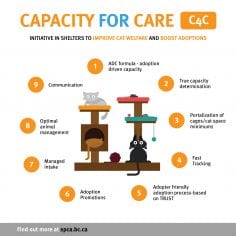The BC SPCA is the largest animal welfare organization of its kind in North America, with 31 Community Animal Centres across the province providing care for abused and homeless animals. In 2025, our Community Animal Centres directly cared for over 14,000 animals (excluding wildlife). Of those animals admitted, cats and kittens accounted for 64.4%, dogs and puppies 27.1%, birds 2%, guinea pigs 1.7%, rabbits 1.6%, horses and farm animals 1%, rats 0.9%, other exotic animals 0.7%, and other small rodents 0.6%. To care for these animals, we use evidence-based standards and programs to ensure that we are minimizing the length of time that animals stay with us, while meeting the unique needs of each and every one.
Information sheets for living with an intact dog, cat, or rabbit
In 2020, many veterinarians in British Columbia temporarily stopped offering elective procedures such as spay and neuter surgeries due to the COVID-19 pandemic. To help families live with intact pets, we developed information sheets on what to expect when living with an unaltered cat, dog, or rabbit. Although these surgeries have resumed, the ongoing veterinary shortage has meant that guardians and adopters in some areas still experience delays in being able to get their pet spayed or neutered. Some BC SPCA locations are still giving out spay/neuter surgery vouchers at the time of adoption to allow animals in these areas to go home while awaiting a surgery appointment.
Information sheets for living with an unaltered cat, dog, or rabbit have been developed to help adopters troubleshoot common problems and set appropriate expectations:
Living With an Intact Female Cat (PDF)
Living With an Intact Male Cat (PDF)
Living With an Intact Female Dog (PDF)
Living With an Intact Male Dog (PDF)
Living With an Intact Female Rabbit (PDF)
Living With an Intact Male Rabbit (PDF)
Canadian Standards of Care in Animal Shelters (CSC)
The Canadian Standards of Care (CSC) in Animal Shelters (PDF) establishes minimum standards of care, as well as best and unacceptable practices.

The BC SPCA participated in the group that created the CSC in 2013. The group, which included Canadian animal welfare experts representing municipal shelters, private shelters and other animal welfare organizations, got together and adopted the 2010 Association of Shelter Veterinarians Guidelines for Standards of Care in Animal Shelters for use in Canada. The updated Guidelines for Standards of Care in Animal Shelters, Second Edition (PDF) was published by the Association of Shelter Veterinarians in 2022.
We are committed to following these standards.
Capacity for Care (C4C)

C4C is an initiative to allow animals in our care to experience the Five Freedoms of Animal Welfare, allow staff an environment with resources to properly care for animals, and increase the positive outcomes (adoptions, return-to-owner, spay/neuter release, etc).
Developed by shelter medicine experts at UC Davis, C4C allows us to meet the needs of every animal that is brought to our shelters and ensure that we have the resources to care for these animals.
Asilomar Accords and Adoptability Guidelines
The Asilomar Accords (PDF) were established in 2004 in a collaborative effort to establish a uniform method for collecting and reporting shelter data with the goal of saving the lives of all healthy and treatable companion animals entering shelters.
In 2016, the BC SPCA implemented the Asilomar Accords data collection system at all BC SPCA sheltering facilities. This process is part of ongoing efforts to save more companion animals, assure consistent operational practices, use resources to help the greatest possible number of animals, and promote transparency and collaboration.
To learn about the BC SPCA Asilomar Accords and Adoptability Guidelines, please read the Executive Summary first. Additional links to the detailed Policy and Survey Results are below.
BC SPCA Adoptability and Asilomar Guidelines Executive Summary (PDF)
Asilomar Accords Adoptability Guidelines Full (PDF)
Asilomar Survey Results (PDF)
2024 Asilomar Annual Report (PDF)
2023 Asilomar Annual Report (PDF)
2022 Asilomar Annual Report (PDF)
2021 Asilomar Annual Report (PDF)
2020 Asilomar Annual Report (PDF)
2019 Asilomar Annual Report (PDF)
2018 Asilomar Annual Report (PDF)
2017 Asilomar Annual Report (PDF)
2016 Asilomar Annual Report (PDF)
Because full implementation of the data collection system was not completed until October 2016, only slightly over half of incoming animals received category assignments. In future years, 100% of animals will receive assignments.
Hide, Perch & Go™ box
 Hide, Perch & Go™ box helps cats adapt to both the shelter and new home environment. The box is designed so that the cat’s one familiar item at the shelter – the Hide, Perch & Go™ box – moves with it by converting to a temporary transport carrier.
Hide, Perch & Go™ box helps cats adapt to both the shelter and new home environment. The box is designed so that the cat’s one familiar item at the shelter – the Hide, Perch & Go™ box – moves with it by converting to a temporary transport carrier.
Learn more about the Hide, Perch & Go™ box or order boxes for your organization today.
Conversation-based adoption matching
With help from the 2003 Report on Adoption Forum II, Phoenix Arizona (PDF) and the HSUS Adopters Welcome, we are reaching our goal of finding every adoptable animal a home and creating pet-friendly humane communities.
Transfer protocols
The BC SPCA moves over 4,000 shelter animals per year within B.C. This helps animal centres in overpopulated areas make space for more animals, and gives animals a better and faster chance to find homes. We are committed to ensuring the health, welfare, and safety of animals and staff during the transfer process. Read our BC SPCA internal policy for animal transfers (PDF).
We also accept a limited number of dogs from outside B.C. into our animal centres if we have capacity. These dogs come from partner rescues and shelters within Canada. The BC SPCA works with community partners first such as city run shelters, foster based organizations, and remote community rescues before expanding to outside B.C.
In order to prioritize support for local dogs and minimize health, welfare and safety risks, we have very strict health and behaviour guidelines for importing dogs from outside B.C.
BC SPCA policy on euthanasia
The BC SPCA does not euthanize healthy companion animals entering our shelters. Read more about our policy on euthanasia.
